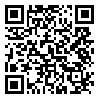1- Apadana Institute of Higher Education
2- Apadana Institute of Higher Education ,m.sherafati@apadana.ac.ir
3- Aliabad Katoul Branch, Islamic Azad University
2- Apadana Institute of Higher Education ,
3- Aliabad Katoul Branch, Islamic Azad University
Abstract: (55 Views)
Background: Diabetes can disrupt the balance of cell death through different cell pathways, and exercise or consumption supplements can be effective in maintaining the balance of cell death types; Therefore, the purpose of this research is the effect of magnesium supplementation and exercise training on the content of CREB2 and C/EBP homologous protein (CHOP) in the left ventricle of the heart of type 2 diabetic rats.
Methods: In this experimental study, 24 2-month-old male Sprague-Dawley rats with an average weight of 280±20 grams were selected. Type 2 diabetes was induced by injecting nicotinamide and streptozotocin solutions. The rats were randomly divided into 4 groups, 1) control, 2) supplement, 3) training and 4) training+supplement; Resistance training consisted of 8 weeks and 3 weekly sessions of climbing a ladder. Magnesium supplement was given to rats once a day. To analyze the data, one-way ANOVA and Tukey's post hoc tests were used in SPSS version 29.
Results: Eight weeks of magnesium supplementation and resistance training led to a significant change in the content of CREB2 and CHOP proteins between groups in the left ventricle of the heart (p=0.001). A significant decrease was observed in the groups of resistance training + magnesium supplement and magnesium supplement compared to the control group (p≥0.05); But the resistance training group had increased compared to the control group (p≥0.05).
Conclusion: The increase and decrease of CREB2 and CHOP proteins in the left ventricle of the heart can lead to improvement and physiological adaptation, like a bilateral mechanism.
Methods: In this experimental study, 24 2-month-old male Sprague-Dawley rats with an average weight of 280±20 grams were selected. Type 2 diabetes was induced by injecting nicotinamide and streptozotocin solutions. The rats were randomly divided into 4 groups, 1) control, 2) supplement, 3) training and 4) training+supplement; Resistance training consisted of 8 weeks and 3 weekly sessions of climbing a ladder. Magnesium supplement was given to rats once a day. To analyze the data, one-way ANOVA and Tukey's post hoc tests were used in SPSS version 29.
Results: Eight weeks of magnesium supplementation and resistance training led to a significant change in the content of CREB2 and CHOP proteins between groups in the left ventricle of the heart (p=0.001). A significant decrease was observed in the groups of resistance training + magnesium supplement and magnesium supplement compared to the control group (p≥0.05); But the resistance training group had increased compared to the control group (p≥0.05).
Conclusion: The increase and decrease of CREB2 and CHOP proteins in the left ventricle of the heart can lead to improvement and physiological adaptation, like a bilateral mechanism.
Send email to the article author
| Rights and permissions | |
 |
This work is licensed under a Creative Commons Attribution-NonCommercial 4.0 International License. |





